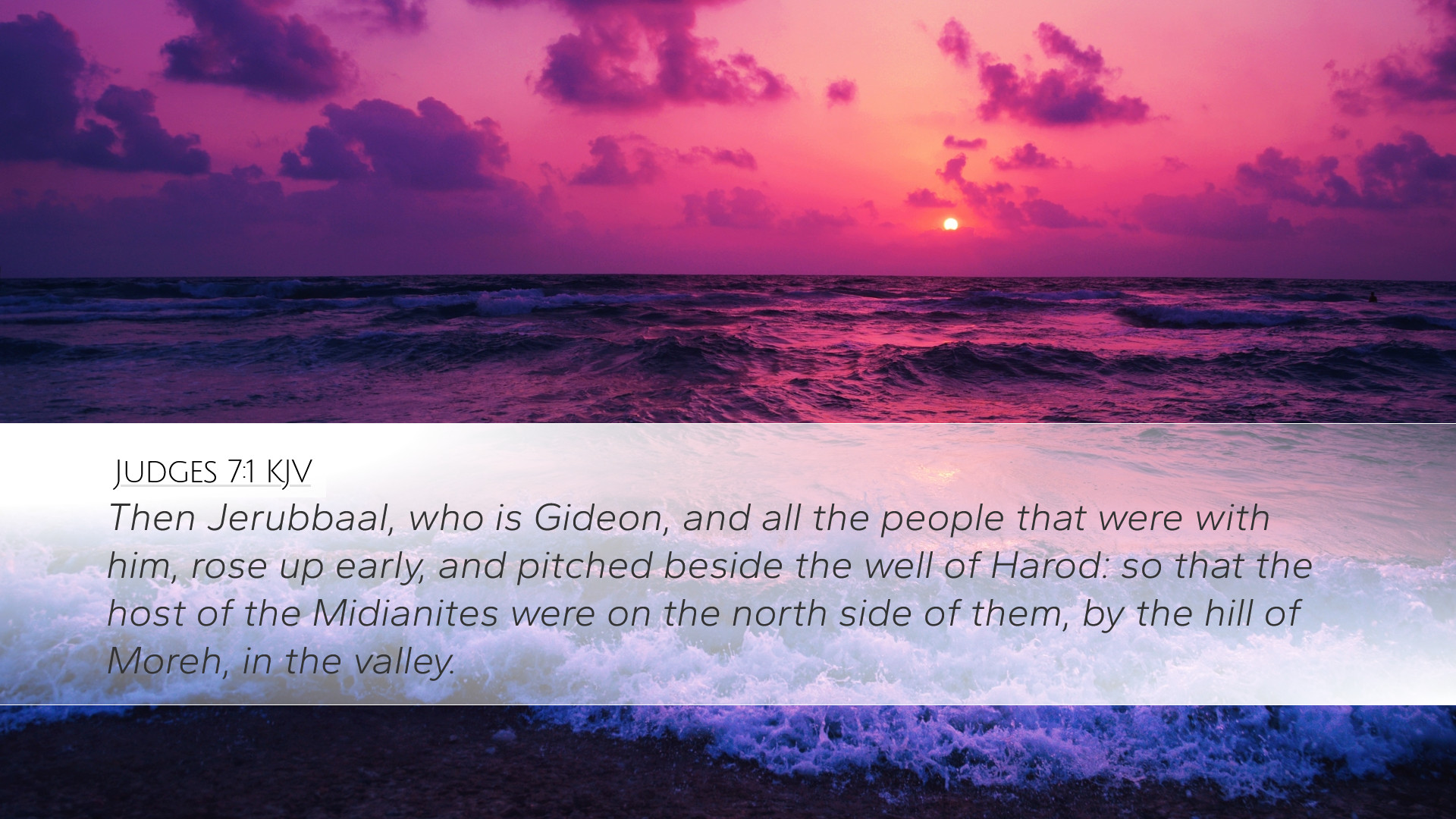Old Testament
Genesis Exodus Leviticus Numbers Deuteronomy Joshua Judges Ruth 1 Samuel 2 Samuel 1 Kings 2 Kings 1 Chronicles 2 Chronicles Ezra Nehemiah Esther Job Psalms Proverbs Ecclesiastes Song of Solomon Isaiah Jeremiah Lamentations Ezekiel Daniel Hosea Joel Amos Obadiah Jonah Micah Nahum Habakkuk Zephaniah Haggai Zechariah MalachiJudges 7:1
Judges 7:1 KJV
Then Jerubbaal, who is Gideon, and all the people that were with him, rose up early, and pitched beside the well of Harod: so that the host of the Midianites were on the north side of them, by the hill of Moreh, in the valley.
Judges 7:1 Bible Commentary
Commentary on Judges 7:1
Introduction
Judges 7:1 presents a pivotal moment in the narrative of Gideon, showcasing the themes of divine selection, human inadequacy, and the power of faith. In this verse, we see Gideon's preparations to face the Midianites, compounded by God's explicit instruction to reduce the number of his warriors. This commentary synthesizes insights from esteemed public domain sources, offering a multi-faceted perspective for pastors, theologians, and students of the Word.
Text of Judges 7:1
"Then Jerubbaal, who is Gideon, and all the people that were with him rose up early and pitched beside the well of Harod: so that the host of the Midianites were on the north side of them by the hill of Moreh in the valley."
Contextual Background
To fully appreciate Judges 7:1, it is essential to understand the historical context. The Israelites were oppressed by the Midianites, leading to a period of desperation and cries for deliverance. God appointed Gideon as a judge to lead His people. Commentators like Matthew Henry illuminate Gideon's initial hesitation and doubt, indicating that his journey toward leadership was fraught with challenges.
Matthew Henry's Commentary
According to Matthew Henry, Gideon’s actions in this verse exemplify obedience. By rising early to mobilize his forces, Gideon demonstrates diligence and readiness to follow God's command. Furthermore, Henry notes that the location near the well of Harod carries symbolic meaning. Water often represents life and sustenance in Scripture, and Gideon's positioning there signifies reliance on God for strength as they prepare to confront their enemies.
Albert Barnes' Analysis
Albert Barnes emphasizes the strategic significance of the geographic context in Judges 7:1. The mention of the Midianite host north of Gideon indicates a tactical military situation. Barnes points out that Gideon's choice of location reflects not only military acumen but also spiritual insight, as he is setting out against overwhelming odds. This moment captures the tension between human strategy and divine intervention.
Adam Clarke’s Insights
Adam Clarke provides a detailed examination of the terms used in this verse. He notes the importance of the name "Jerubbaal," which means "let Baal contend." This signifies Gideon's role in challenging the false gods of the Midianites. Clarke underlines the theological implications of such a confrontation, highlighting the struggle between the God of Israel and the false idols that had infiltrated Israel's belief system.
Theological Implications
Judges 7:1 serves as a profound reminder of God’s sovereignty and the nature of divine calling. The reduction of Gideon’s army, as revealed later in the chapter, underscores the principle that God often works through human weakness to manifest His strength. Theologically, this reflects the concept of divine favor and the significance of faith over numbers and resources.
The Theme of Divine Selection
The selection of a seemingly timid leader (Gideon) to confront a powerful enemy emphasizes God’s selective grace. As Matthew Henry describes, God often chooses the least likely candidates to accomplish divine purposes. This serves as an encouragement for individuals feeling unqualified for their calling, reiterating that God equips those He calls.
Human Inadequacy and Divine Power
The subsequent military campaign against the Midianites, beginning in chapter 7, highlights human inadequacy. Gideon's initial resources are inadequate for such a task, echoing themes found in other biblical narratives where God utilizes smallness and weakness (e.g., David and Goliath). Barnes notes that this pattern reaffirms the biblical principle that “not by might, nor by power, but by my Spirit” (Zechariah 4:6).
Practical Applications
For pastors and church leaders, Judges 7:1 encourages reliance on God's guidance in decision-making processes. The importance of prayer, seeking divine wisdom, and careful planning is mirrored in Gideon's actions. It serves as a reminder that God’s directives may not align with human expectations, inviting faith and obedience to divine leading.
Encouragement for Believers
This passage can inspire believers facing daunting challenges. Like Gideon, they may feel overwhelmed and under-equipped to face their circumstances. However, reflecting upon God's faithfulness and past victories can instill confidence. Clarke’s insights encourage individuals to remember that confronting false beliefs and challenges often requires courage and reliance on God's power.
Conclusion
Judges 7:1 is rich with themes that resonate through the ages: God's sovereignty, the interplay between faith and human action, and the transformative power of obedience. By examining this verse through the lenses of Matthew Henry, Albert Barnes, and Adam Clarke, we gain valuable theological insights and practical applications relevant to modern-day believers. As we reflect on Gideon and his mission, may we be encouraged to embrace our God-given callings, confidently trusting in God's strength to confront our 'Midianites.'


